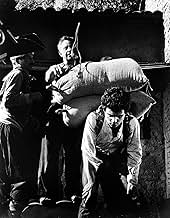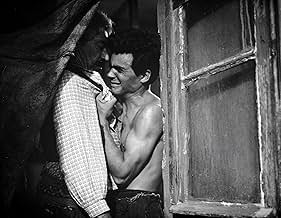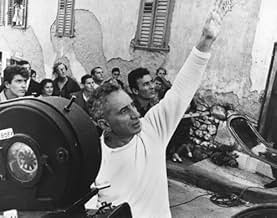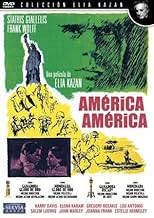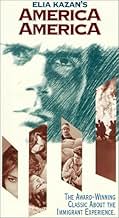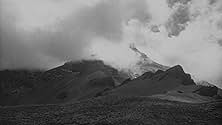IMDb-BEWERTUNG
7,7/10
6320
IHRE BEWERTUNG
Ein junger Grieche schreckt vor nichts zurück, um sich eine Überfahrt nach Amerika zu sichern.Ein junger Grieche schreckt vor nichts zurück, um sich eine Überfahrt nach Amerika zu sichern.Ein junger Grieche schreckt vor nichts zurück, um sich eine Überfahrt nach Amerika zu sichern.
- 1 Oscar gewonnen
- 7 Gewinne & 12 Nominierungen insgesamt
Garrett Cassell
- Dog Walker
- (Nicht genannt)
Tom Holland
- Voice Overs
- (Synchronisation)
- (Nicht genannt)
Elia Kazan
- Self
- (Synchronisation)
- (Nicht genannt)
Empfohlene Bewertungen
Imagine a film like "The Godfather" receiving almost no audience, relegated to the occasional appearance on the AMC channel, barely being released on VHS or DVD, and you will have some idea of the tragic fate of this lost epic masterpiece. As hard as it is to believe, this may be the prolific director Elia Kazan's greatest film achievement, yet hardly anyone has seen it. This is a film on the epic scale of "The Godfather," about a young Armenian man's escape from Turkish persecution, flight from Anatolia, and eventual immigration to Ellis Island - all based upon the the experiences of the director's uncle. What is also tragic is the fact that I can think of no other film which portrays the cruel persecution and genocide inflicted upon the Armenian minority by the Ottoman Turks in the early 20th century (which Hitler correctly pointed to as proof that the world would look the other way at the genocide he had planned in Europe in the 1930s). Every period detail in the film is perfect, from the Oscar-winning costume design to the set design, Greek folk music score, veteran Haskell Wexler's cinematography, and acting - especially lead actor Giallelis, whose intensity brings to mind some of Brando's early work.
It is obvious that this film was a very personal piece of film-making for Kazan. And though I don't want to dwell as others do on Kazan's checkered past in his naming of communist colleagues for HUAC in the 1950s, it is interesting to note a parallel in the main character Stavros' personal anguish in making the choice to leave his wealthy wife and use her money to immigrate to the United States; both men made the conscious decision to drive a wedge between them and their past relationships. This is truly a film for all Americans to treasure, and if I had my way, I would make sure it was broadcast every 4th of July just as "It's a Wonderful Life" is broadcast every Christmas. As a nation of immigrants and descendants of immigrants, this is a film virtually every American can relate to. I can't figure out why it is so obscure.
It is obvious that this film was a very personal piece of film-making for Kazan. And though I don't want to dwell as others do on Kazan's checkered past in his naming of communist colleagues for HUAC in the 1950s, it is interesting to note a parallel in the main character Stavros' personal anguish in making the choice to leave his wealthy wife and use her money to immigrate to the United States; both men made the conscious decision to drive a wedge between them and their past relationships. This is truly a film for all Americans to treasure, and if I had my way, I would make sure it was broadcast every 4th of July just as "It's a Wonderful Life" is broadcast every Christmas. As a nation of immigrants and descendants of immigrants, this is a film virtually every American can relate to. I can't figure out why it is so obscure.
Absolutely loved the idea for the story, and love it when films take on a very personal approach. Something that 'America America' did and one can tell from as early on as the opening voice over. Elia Kazan made so many great films and seldom made a bad one (even his worst, for me between 'The Sea of Grass' and 'The Visitors', is not that bad), he was a fine director and an influential one. Especially in his distinctive directing of actors, and one of the best at it, and it is a shame that his politics and testimony harmed somewhat his reputation.
For me, 'America America' is not one of Kazan's best films and others have a bigger influence in film and on me. There is plenty though of what made Kazan so great a director and why his high regard was richly deserved. 'America America' to me was still a great film, perhaps his most personal out of all his films (almost auto-biographical, with it being based on the experiences of his own uncle) and it was very difficult to not admire it.
Inexperience at times shows in the acting of Stathis Giallelis, with there being times where he seemed unsure. When it comes to nit-picks regarding 'America America' that is pretty much it.
Giallelis mostly does very well in his role, not easy handling a big and difficult role so young but he does understated wonders in his best moments. Where Kazan also shows his great skill in how he managed to get the best out of his actors (much of the best of his performances from his films, in a list that includes Vivien Leigh, Marlon Brando, James Dean, are iconic), even those that were not always great or inexperienced. The rest of the acting is every bit as good, especially from Linda Marsh, Paul Mann and best of all Lou Antonio.
Kazan's direction is exemplary, keeping one riveted throughout the long running time. 'America America' is a very well made film, beautifully lit and framed and was really intrigued by its documentary-like style in how it was shot without being heavy-handed. The Oscar win for the art direction was richly deserved. The music score is great in its authenticity and makes one feel that you are there where the film is set.
The script also garnered award attention and understandably so, as it is very thought-provoking, can be quite gritty and doesn't sugar coat. The opening voice over is a very good indication of what to expect, making it very clear that it was a personal effort for Kazan without being egotistical. The story is long in length while not being long-winded, and is both touching and suitably uncompromising.
Summarising, truly great. 9/10
For me, 'America America' is not one of Kazan's best films and others have a bigger influence in film and on me. There is plenty though of what made Kazan so great a director and why his high regard was richly deserved. 'America America' to me was still a great film, perhaps his most personal out of all his films (almost auto-biographical, with it being based on the experiences of his own uncle) and it was very difficult to not admire it.
Inexperience at times shows in the acting of Stathis Giallelis, with there being times where he seemed unsure. When it comes to nit-picks regarding 'America America' that is pretty much it.
Giallelis mostly does very well in his role, not easy handling a big and difficult role so young but he does understated wonders in his best moments. Where Kazan also shows his great skill in how he managed to get the best out of his actors (much of the best of his performances from his films, in a list that includes Vivien Leigh, Marlon Brando, James Dean, are iconic), even those that were not always great or inexperienced. The rest of the acting is every bit as good, especially from Linda Marsh, Paul Mann and best of all Lou Antonio.
Kazan's direction is exemplary, keeping one riveted throughout the long running time. 'America America' is a very well made film, beautifully lit and framed and was really intrigued by its documentary-like style in how it was shot without being heavy-handed. The Oscar win for the art direction was richly deserved. The music score is great in its authenticity and makes one feel that you are there where the film is set.
The script also garnered award attention and understandably so, as it is very thought-provoking, can be quite gritty and doesn't sugar coat. The opening voice over is a very good indication of what to expect, making it very clear that it was a personal effort for Kazan without being egotistical. The story is long in length while not being long-winded, and is both touching and suitably uncompromising.
Summarising, truly great. 9/10
I saw America America way back when I was a teen and had not seen it since till
today. I was surprised at how much I remembered of it. It was like reliving tales
told by my grandparents and some of their siblings of their immigration stories.
In this case this was fashioned tales of Elia Kazan's parents and their siblings woven together to create an immigrant story. It's not pretty at times and the black and white cinematography accents the harshness of the experience.
Kazan's protagonist is young Stathis Giallelis and a few familiar character actors are in the cast. No box office names though to accent the reality of the story. Giallelis is a Greek in Turkish Anatolia, a place where during the Ottoman Empire persecuting Greeks and Armenians was a national pasttime. Not that persecution led to any kind of solidarity, the two minorities had it in for each other as much as the Turks.
Giallelis hears of America, a fabled land where this sort of organized persecution and permanent status at the bottom of society doesn't happen. He resolves to go, but his family only sends him as far as Istanbul (as Greeks they still call it Constantinople)to help out one of the relatives.
He hears the fare is 110 English pounds and one way or another he's going.
The last 15 minutes or so is when Giallelis arrives and there's a compelling montage of immigrants including our protagonist doing all kinds of menial jobs that we who are here won't do. It's no different today with the current folks who want to come here, the ones our current administration is bent on scapegoating for its own purposes. Look folks, that montage tells more than the Kazan family story. it's your story or mine unless you were born an American Indian.
And speaking for the Kogans, Lucyshyns, Scrobacks, and Fleischmans, I'm glad Elia Kazan made America America and told the tale.
In this case this was fashioned tales of Elia Kazan's parents and their siblings woven together to create an immigrant story. It's not pretty at times and the black and white cinematography accents the harshness of the experience.
Kazan's protagonist is young Stathis Giallelis and a few familiar character actors are in the cast. No box office names though to accent the reality of the story. Giallelis is a Greek in Turkish Anatolia, a place where during the Ottoman Empire persecuting Greeks and Armenians was a national pasttime. Not that persecution led to any kind of solidarity, the two minorities had it in for each other as much as the Turks.
Giallelis hears of America, a fabled land where this sort of organized persecution and permanent status at the bottom of society doesn't happen. He resolves to go, but his family only sends him as far as Istanbul (as Greeks they still call it Constantinople)to help out one of the relatives.
He hears the fare is 110 English pounds and one way or another he's going.
The last 15 minutes or so is when Giallelis arrives and there's a compelling montage of immigrants including our protagonist doing all kinds of menial jobs that we who are here won't do. It's no different today with the current folks who want to come here, the ones our current administration is bent on scapegoating for its own purposes. Look folks, that montage tells more than the Kazan family story. it's your story or mine unless you were born an American Indian.
And speaking for the Kogans, Lucyshyns, Scrobacks, and Fleischmans, I'm glad Elia Kazan made America America and told the tale.
The picture talks about a Greek young from Anatoly ( Turkey ) named Stavros ( Stathis Giallelis ). He is sent by his father to Constantinopla for helping their family . Howewer Stavros only thinks on America . Across the journey he will suffer several misfortunes , risks and odds in his relationships to friends (Frank Wolff, John Marley, Lou Antonio) and enemies . Later on , Stavros will work in laborious employments to obtain a passage in a splendid ship for the promised land.
The movie is a magnificent adaptation based on the autobiographic novel of Greek-Turkish director Elia Kazan who being a child emigrated along with his family to United States . Since the initiating he describes memories , emotions and infancy images , besides narrates the persecution to Greeks and Armenians by Turkish that finished in genocide . Kazan reflects the particular characters , rural sets in realism way , folkloric customs , glimmer landscapes as well as interior homes . Kazan achieved a real emotion and sensibility by means of slow-moving scenes and close-ups of protagonists full of dialogs dealing with essential feeling as familiar love , friendship or happiness . These images contrast with the breathtaking outdoors of the mountains and countrysides where are developed the events . Magnificent cinematography in black and white by Haskel Wexler . Awesome and evocative musical score in oriental style by Manos Hadjidakis ( Topkapi ). The motion picture is very well directed by Elia Kazan ( On the waterfront ) . The release won Academy Award , an Oscar for production design and attained three nominations referred to Director and original screenplay , plus obtained a Golden Globe for Director and the biggest prize in Festival of San Sebastian . Rating : Above average and astounding movie. Well worth watching .
The movie is a magnificent adaptation based on the autobiographic novel of Greek-Turkish director Elia Kazan who being a child emigrated along with his family to United States . Since the initiating he describes memories , emotions and infancy images , besides narrates the persecution to Greeks and Armenians by Turkish that finished in genocide . Kazan reflects the particular characters , rural sets in realism way , folkloric customs , glimmer landscapes as well as interior homes . Kazan achieved a real emotion and sensibility by means of slow-moving scenes and close-ups of protagonists full of dialogs dealing with essential feeling as familiar love , friendship or happiness . These images contrast with the breathtaking outdoors of the mountains and countrysides where are developed the events . Magnificent cinematography in black and white by Haskel Wexler . Awesome and evocative musical score in oriental style by Manos Hadjidakis ( Topkapi ). The motion picture is very well directed by Elia Kazan ( On the waterfront ) . The release won Academy Award , an Oscar for production design and attained three nominations referred to Director and original screenplay , plus obtained a Golden Globe for Director and the biggest prize in Festival of San Sebastian . Rating : Above average and astounding movie. Well worth watching .
Kazan's reputation seems to have been diminishing for some time, a process, ironically, that his 'Lifetime Achievement' Oscar seems to have accelerated. Yeah, he did betray his fellows and himself in the 1950s. Again, ironically, it's the films he made later in his career, which show the scars of his loss of self-esteem, which are the most fascinating - WILD RIVER, SPLENDOR IN THE GRASS, THE ARRANGEMENT - and most powerful of them all, AMERICA AMERICA.
I too am surprised that this monument to Americanism and monument of American cinema, seems not very widely known in America itself. It has all the values of classic American cinema - a strong, simple narrative, a limpid visual style which eschews any directorial histrionics to concentrate purely on the characters. It is the story of young men driven from their homeland and making the long voyage to America - the huddled masses yearning to be free. The journey is long and terribly hard, and even as the shore of American comes into view, sacrifices still have to be made. The end of the film is enormously powerful, one of the most moving I have ever seen - the effect is still with me now, 30 years after seeing it.
It is the story of Kazan's father and uncle - the character who makes an appearance, played by Richard Boone, in Kazan's more heavily fictionalised subsequent film THE ARRANGEMENT. It is a personal story, and the simplicity of the telling seems like the end of a process of endless re-telling around smokey fireplaces, and before children go to sleep, a family saga which has almost attained the status of myth. The savagery of the film's first hour, and the dream-like quality of the last act make AMERICA AMERICA a genuine and powerful part of American mythology.
So don't torture yourself about whether Kazan was morally and politically wrong in betraying his colleagues - see AMERICA AMERICA, and you'll see why he could never have acted any differently. Yes, he was a radical, and a leftist, and a deeply intelligent and passionate man; but he was also an immigrant - and his horror of disenfranchisement and ejection overcame his moral and political views. Kazan may criticise aspects of its culture and politics, but he loves and respects and is grateful to America above all. So he made his choice. He could have made no other.
I too am surprised that this monument to Americanism and monument of American cinema, seems not very widely known in America itself. It has all the values of classic American cinema - a strong, simple narrative, a limpid visual style which eschews any directorial histrionics to concentrate purely on the characters. It is the story of young men driven from their homeland and making the long voyage to America - the huddled masses yearning to be free. The journey is long and terribly hard, and even as the shore of American comes into view, sacrifices still have to be made. The end of the film is enormously powerful, one of the most moving I have ever seen - the effect is still with me now, 30 years after seeing it.
It is the story of Kazan's father and uncle - the character who makes an appearance, played by Richard Boone, in Kazan's more heavily fictionalised subsequent film THE ARRANGEMENT. It is a personal story, and the simplicity of the telling seems like the end of a process of endless re-telling around smokey fireplaces, and before children go to sleep, a family saga which has almost attained the status of myth. The savagery of the film's first hour, and the dream-like quality of the last act make AMERICA AMERICA a genuine and powerful part of American mythology.
So don't torture yourself about whether Kazan was morally and politically wrong in betraying his colleagues - see AMERICA AMERICA, and you'll see why he could never have acted any differently. Yes, he was a radical, and a leftist, and a deeply intelligent and passionate man; but he was also an immigrant - and his horror of disenfranchisement and ejection overcame his moral and political views. Kazan may criticise aspects of its culture and politics, but he loves and respects and is grateful to America above all. So he made his choice. He could have made no other.
Wusstest du schon
- WissenswertesOf all the films he had directed, this one was Elia Kazan's favorite film, as it was very personal to him.
- PatzerAn old woman is humming a tune from Astor Piazzolla's Libertango in the 1900s, decades before the composer was even born.
- Zitate
Elia Kazan: [Voice- over] My name is Elia Kazan. I am a Greek by blood, a Turk by birth and an American because my uncle made a journey.
- Crazy CreditsDirector Elia Kazan narrates the main portion of the closing credits, reading the words as they appear on the screen, using complete sentences such as "The cinematography was by Haskell Wexler."
- VerbindungenEdited into Grand format: Amerika made in Hollywood (2006)
- SoundtracksExcitement In The Village
Top-Auswahl
Melde dich zum Bewerten an und greife auf die Watchlist für personalisierte Empfehlungen zu.
- How long is America America?Powered by Alexa
Details
- Erscheinungsdatum
- Herkunftsland
- Offizielle Standorte
- Sprache
- Auch bekannt als
- America America
- Drehorte
- Produktionsfirmen
- Weitere beteiligte Unternehmen bei IMDbPro anzeigen
- Laufzeit
- 2 Std. 54 Min.(174 min)
- Farbe
- Seitenverhältnis
- 1.85 : 1
Zu dieser Seite beitragen
Bearbeitung vorschlagen oder fehlenden Inhalt hinzufügen







